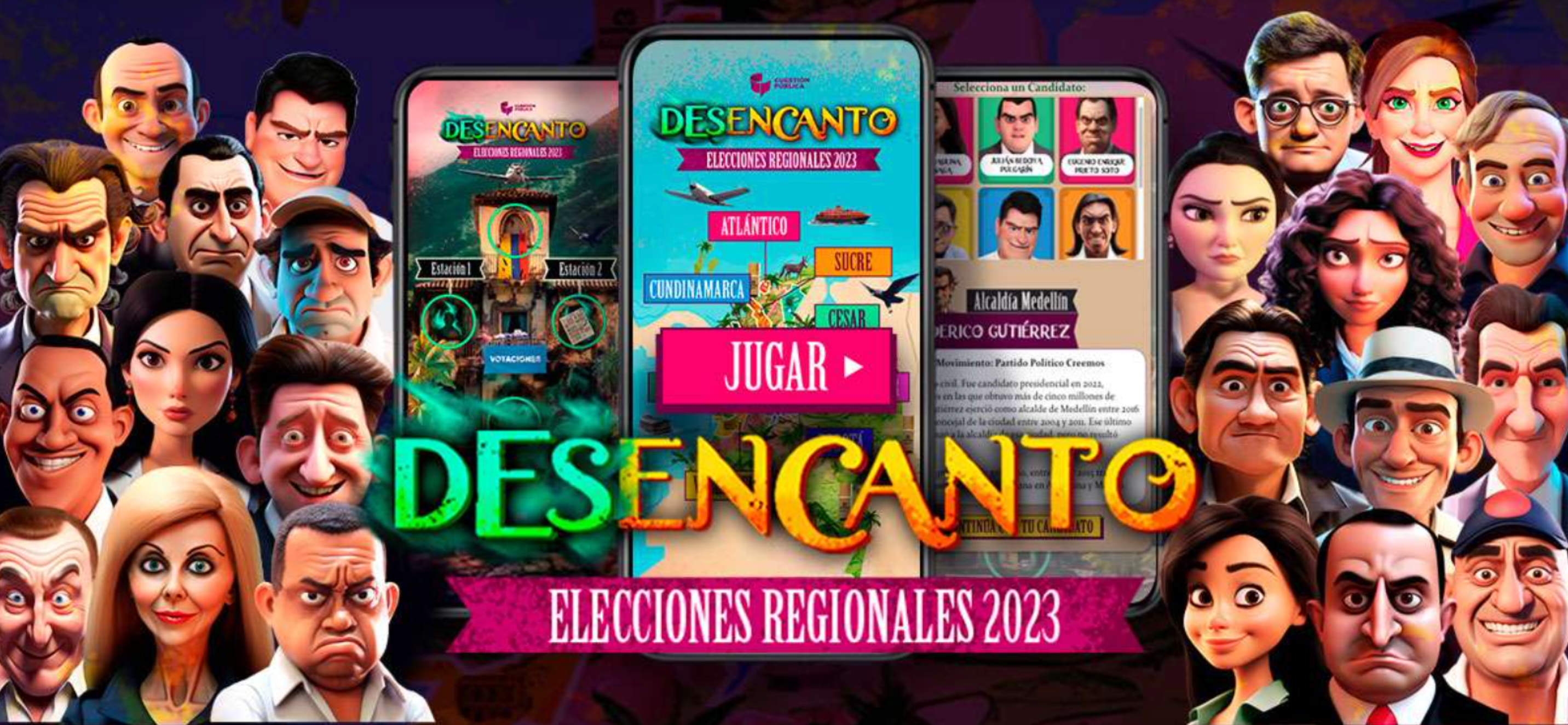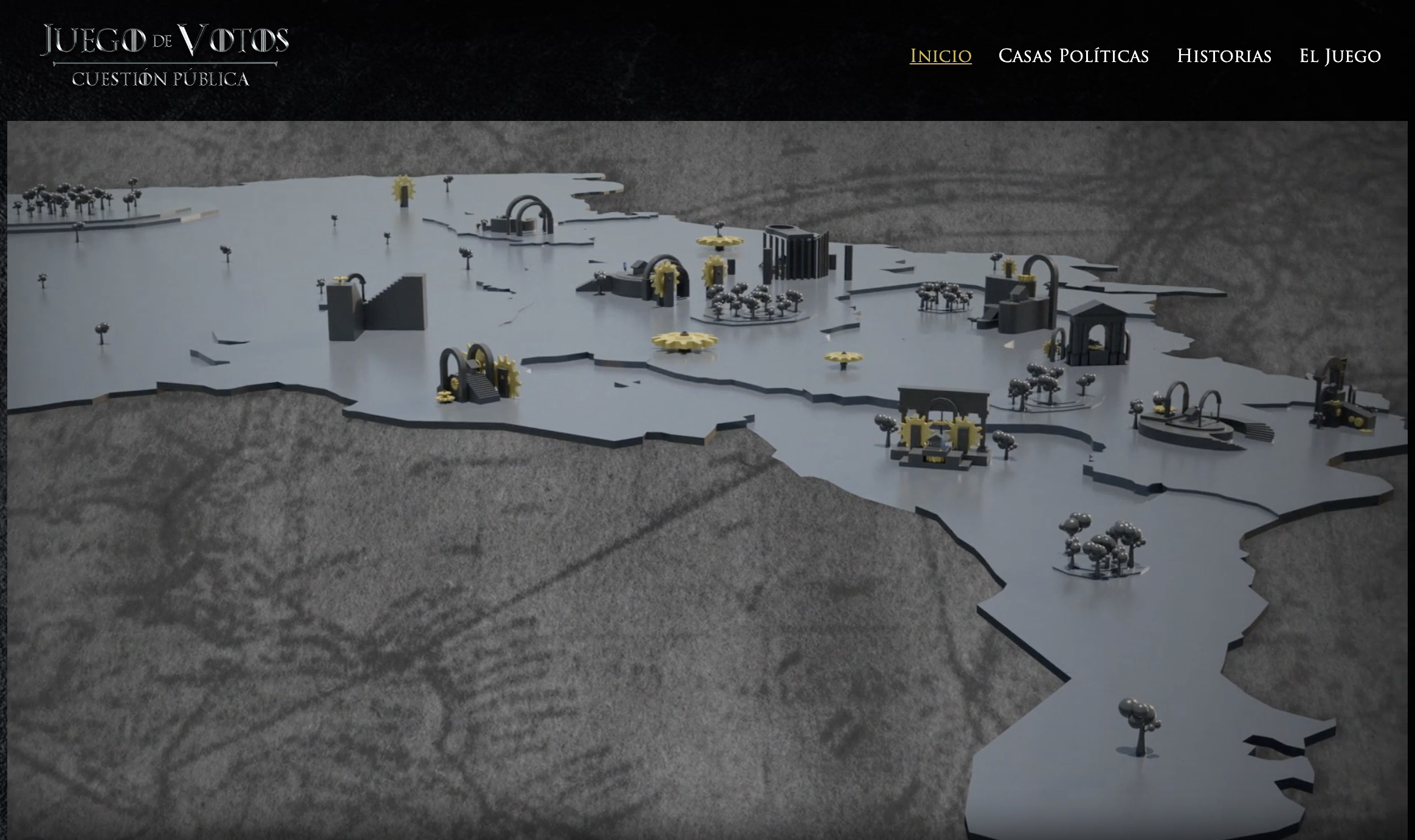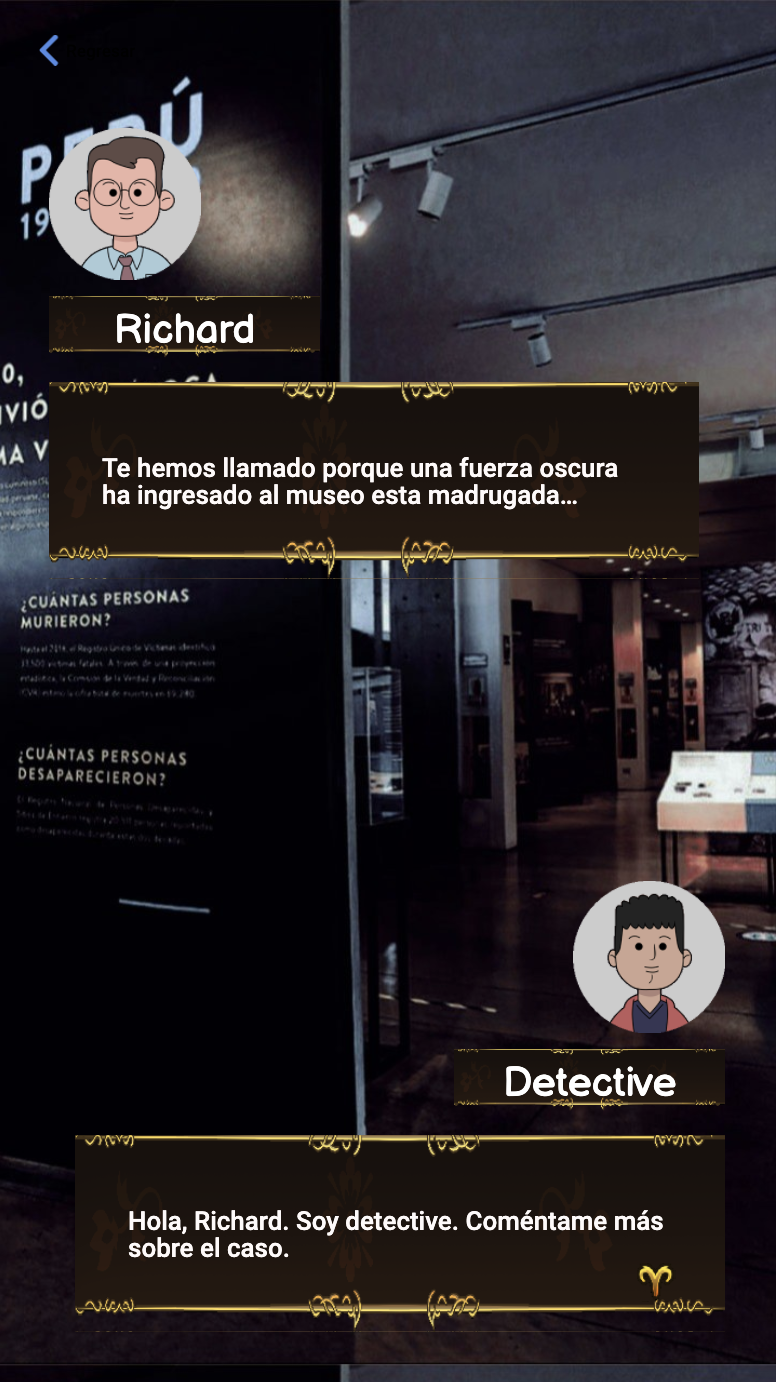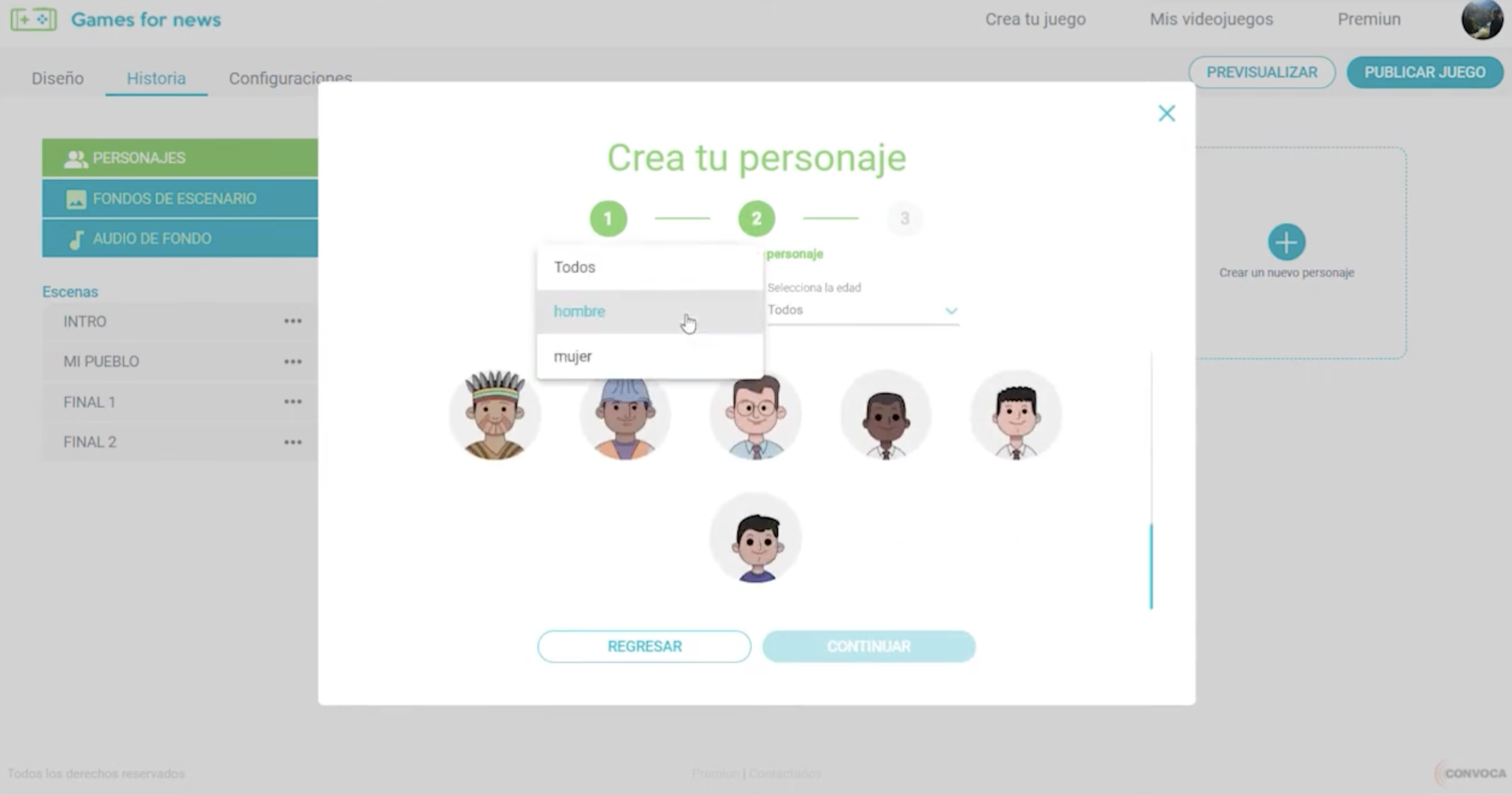In Colombia, a group of political families carry with them a dark shadow of links to evil forces. Colombian citizens will have to face a series of challenges to discover the true face of those who seek to ascend to power.
The above is not the plot of a movie or series. This is “Desencanto” (Disenchantment), an interactive game developed by Colombian digital native Cuestión Pública, published in October of this year at the time of local elections in Colombia.
The game is based on the concept of the Disney film “Encanto,” released in 2021 and which takes place in Colombia. It playfully presents a journalistic investigation about candidates who have pending legal cases or alleged links with criminal or paramilitary organizations.

With the visual style of "Encanto" movie, Cuestión Pública's interactive game presented in a playful way a journalistic investigation on the dark side of candidates for regional elections. (Photo: Screenshot)
The user must choose a candidate from a gallery of Disney-style animated faces and answer a series of questions until they discover that candidate's “disenchantment” with reality.
“Desencanto” is the most recent of five interactive games that Cuestión Pública has produced since 2020 and with which it has consolidated a proposal for “gamification” of data journalism in the region.
Cuestión Pública and Convoca, from Peru, are examples of journalistic organizations in Latin America that are betting on interactive games to bring younger audiences closer to the news and to contribute to media literacy. At the same time, they are disseminating investigations that have an impact on the public agenda and create new financing possibilities for the media outlet.
Gamification is defined as the application of game elements in non-gaming contexts, according to the Swedish journalist Anna Thulin, who conducted research on gamification in journalism with the London School of Economics and published results in 2022. This technique has been used for years in areas such as education, marketing and business. In journalism, gamification is the use of video game principles to make news consumption more attractive and increase reader engagement and loyalty.
“These news apps are really a way to reach a young audience. It is like in our DNA at Cuestión Pública, it is not a trend,” Claudia Báez, general director and co-founder of the digital media outlet, told LatAm Journalism Review (LJR). “I really believe that the hallmark of Cuestión Pública is that mix between data and investigation, and that the production of the data visualizations or the digital product does justice to the journalistic investigation.”
Before “Desencanto,” Cuestión Pública released “Sabemos lo que hiciste la legislatura pasada” (We know what you did last term) and “Juego de Votos” (Game of Votes). The first, published in 2020, is an investigative series that exposed the assets, alleged conflicts of interest and networks of power of more than 75 Colombian congressmen, including the current president and then senator Gustavo Petro, through an interface that simulates an Instagram profile, titled “Indi$cregram.” That was the product that set the tone of the working method for the development of recreational applications that the media outlet would perfect until reaching “Disenchantment.”
In 2022, “Juego de Votos” arrived, an investigation into the most powerful political clans in the country, published at the time of the presidential and legislative elections of that year. It included an interactive game in which the user could make predictions for presidential elections and any run-offs. Everything, with the graphic style of the HBO series “Game of Thrones.”
“Our news applications are designed for specific moments where the average citizen really has a greater desire to obtain information. We think very carefully about all these applications so that people make better decisions,” Báez said. “Popular culture offers that window where you can quickly engage a young audience, because you have the collective imagination that boosts curiosity about a topic that for the Colombian public has already grown stale.”
Cuestión Pública requested authorization to create a vallenato [Colombian regional style] version of the “Game of Thrones” theme song for “Juego de Votos”. For “Desencanto”, they paid for a theme song similar to the one in the Disney’s movie. In no case have they had any copyright issues, as these games are non-for-profit products of public interest.
Data journalism investigations presented in the form of interactive games have earned Cuestión Pública international recognition. “Juego de Votos” won the WAN-IFRA 2022 LATAM Digital Award for Best Digital Journalism Project and this year it was also recognized with the Sigma Award. Also this year, the news outlet won the King of Spain Award for Journalism for the Ibero-American Media.
Although the team is grateful that “Juego de Votos” has brought Cuestión Pública prestige as a benchmark for data journalism and innovation, for Báez and her team the main impact of their gamification projects is not the awards, but the interest they arouse in their readers and the consequences they have caused in the country’s public agenda.

At the context of Colombia's 2022 presidential and legislative elections, Cuestión Pública launched "Juego de Votos", an investigation into the country's most powerful political clans. (Photo: Screenshot)
The journalist said that “Juego de Votos” and “Sabemos lo que hiciste…” were published in installments over several weekends, which generated expectation among the audience and the political class. In addition, several Colombian media outlets republished information from “Juego de Votos” in their coverage of the 2022 elections. And, above all, both products have garnered a high volume of visits to the site and have become reference points for citizens to consult due to the high level of documentation presented.
“'Sabemos lo que hiciste...' is the most visited Cuestión Pública application in its entire history. People go and consult it even after it was published in 2020,” Báez said. “They are such deep investigations and with such well-structured methodologies that they become investigations that do not lose currency, because all that information was collected for months to arrive at such a consolidated product.”
But the main indicator of success for the media outlet is the discomfort that its gamified products have caused for the people involved. After the publication of “Sabemos lo que hiciste…”, several congressmen – including the current president – issued statements to try to deny the information. Others made requests for rectification. And others even took the journalists to court.
Both Báez and Diana Salinas, editorial director and co-founder of Cuestión Pública, were criminally denounced for defamation by the former president of the Senate for publishing his alleged links with drug traffickers in “Sabemos lo que hiciste…”. In 2021, the Foundation for Press Freedom (FLIP, for its acronym in Spanish), which defends the journalists in the case, requested that the Colombian Attorney General’s Office archive the complaint for violating the right to freedom of the press. However, there has been no response, Báez said.
“That means that the investigation has really made them uncomfortable, that they are reading us,” she said. “[Success] is not measured so much in pages [views] because we know that we are a small media outlet that does not have the reach of large media, but for our metrics it is quite good. And the impact is in the reality.”
Playful applications such as “Sabemos lo que hiciste,” “Juego de Votos” or “Disenchantment,” which have a high stake in design and different types of interaction, are products that require a strong investment of economic, technical and human resources. However, Báez said, they are also products that are easier to sell to funders because of how novel and attractive they are.
“For a media outlet like Cuestión Pública, they are very big efforts, they are expensive,” she said. “First, there is a learning curve for the journalists involved in it to learn the method. Two, they are months-long investigations. And three, you have to have a team of very high-level developers and designers.”
The Colombian media outlet has structured a formula that is effective for financing and developing journalistic investigations with interactive games, which consists of generating an idea, putting together a pitch and presenting it to organizations that finance innovative journalism.
Once it’s financed, Báez recruits a team of professionals who will form a temporary editorial team, dedicated solely to the development of the product. Under this methodology, Cuestión Pública, whose permanent staff is limited to 20 people, is capable of developing innovative products without neglecting other areas of work.
“It's like a parallel newsroom in terms of investigation. You have to hire an army of fact-checkers, because here the fact-checking part is key, it is what is going to really adjust the size of the journalistic findings,” Báez said. "Generally, to make these applications, we generate and create an entire workflow that we communicate to the entire team that creates the application, and we begin to make it work like a clock."

"En Búsqueda de la Verdad" (In Search of the Truth) is the winning video game of the "Verdades vs. Mentiras" initiative for university students, launched by Convoca. (Photo: Screenshot)
The implementation of these temporary newsrooms has made Cuestión Pública like a school in which young journalists are trained in the media outlet’s methodology and in the techniques of developing data investigations. The journalist said that several of her team members joined after participating in the creation of gamified products.
“Not every investigative journalist can make a 'Juego de Votos' or 'Sabemos lo que hiciste...', because everything is focused on Excel. So anyone who doesn't have Excel skills will find the investigation very difficult,” said Báez. “I can already identify which journalists have the stature to be able to join the Cuestión Pública editorial team because they are investigators and when they go through an application like 'Sabemos lo que hiciste...', 'Juego de Votos', they already know the Cuestión Pública method. Then it is easier to make them part of the team.”
Since it was founded in 2015, Peruvian investigative journalism outlet Convoca aimed to experiment with all types of digital narratives, including that of video games. Its first approach was in 2016, within the framework of a mega investigation into the transnational corruption case known as Lava Jato. It included an interactive “hangman”-type question and answer game.
In subsequent investigations, they developed interactive games of increasing complexity in design and programming, such as “Ilusión Fiscal: El Juego de las Offshore” (Tax Ilusion: the Offshore Game) in the context of the investigation into the Panama Papers.
The digital media outlet realized that as the complexity of games increased, so did the costs and production time. According to Milagros Salazar, director and founder of Convoca, each video game cost between US $8,000 and 10,000, and took between one and four months of work, which didn’t make them very viable for an independent outlet.
This is how the idea of creating Games for News arose. It’s a platform for creating personalized video games that seeks to expand the reach of investigative stories and share knowledge in a simple way.
“We said 'Why don't we create an intuitive platform that allows us to create more video games, but in the style of educational video games, which are simple, but the message is clear and direct?,'” Salazar told LJR. “The basic proposal of Games for News was that you could create a video game without having to be a programmer or designer, but only by having a good story of public interest to tell.”
Once Games for News was launched in 2020 with the support of Google News Initiative, the media outlet discovered that the tool had potential not only to present its content in an attractive way, but also for the educational field.
The media outlet incorporated Games for News into Escuela Convoca, its investigative journalism training division. They have used it to train journalists in Peru, through initiatives such as Investigatour Amazonía; and professionals from other countries, such as in the Fact-Checking Mentorship Program of the International Fact-Checking Network, in which they participated as mentors.
“When we teach an investigative journalism program, we propose Games for News as a format for [other journalists] to relay their investigation,” Salazar said. “It is also very present in workshops and at the conferences we hold.”
More recently, Convoca discovered that Games for News provided an opportunity to generate interest in news among younger audiences. This year, within the framework of the 20th anniversary of the publication of the Report of the Truth and Reconciliation Commission in Peru on the internal armed conflict in that country between 1980 and 2000, Convoca launched a video game creation contest with the theme of the report for university students. The objective, Salazar said, was for young people of the current generation to read the document and talk about what caught their attention the most in a playful format using Games for News.
Twenty teams of between four and five communication or journalism students from Peru participated in the contest, titled “Verdades vs. Mentiras” (Truths vs. Lies). Five of these teams moved on to a final stage in which they received mentoring and training from the Convoca team on the use of the platform. The top three teams were announced in October of this year.
“It was a very enriching experience,” Scarlett Cardoza, project coordinator at Convoca, told LJR. “Games for News, which we offer to citizens, is generally a fairly intuitive platform. It is quite quick to understand and the general population has been able to use it.”
Cardoza added that the media outlet is preparing a call to hold a similar contest, but for middle and high school students around the topic of bullying. They are currently in a stage of analyzing the school sector in Peru and searching for allies to carry out the project.

Games for News is available for journalists from other media and the general public who want to create simple interactive games to tell their stories. (Photo: Screenshot)
Meanwhile, Games for News is available to journalists from other media and members of the general public who want to create simple interactive games to tell their stories. The platform offers four types of membership, including a free one, which have also become an extra source of funding for Convoca.
“We are now receiving advice from ICFJ [International Center for Journalists], with the Elevate program, to find ways to monetize with Games for News,” Salazar said. "We are trying. We still cannot tell you that it represents an important source of income, but we are going down that path of diversification.”
But for Salazar, beyond the fact that gamification offers attractive ways to present investigations, train journalists or monetize, it is also one more way to promote the objectives of Convoca's journalism, which are to strengthen accountability of those in power, combat disinformation and create changes in society, the journalist said. And directing these gamified products to younger audiences contributes to their media literacy and makes them aware of issues of public interest.
“If there are 100 journalism students who are in charge of reading the Truth Commission Report and consult various sources, it is no longer just the small Convoca team working on one objective, but rather it multiplies the possibility that the content will reach more citizens and make them aware of this issue,” Salazar said.